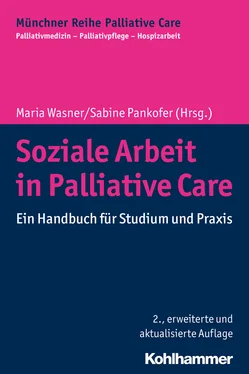Abschließend ein paar persönliche Anmerkungen:
Wir sind zwei Herausgeberinnen – daher braucht es auch zwei Danksagungen. Denn wir beide haben sehr unterschiedliche Hintergründe und Erfahrungen sowie Menschen, denen wir viel verdanken.
Maria Wasners erster persönlicher Dank gilt Prof. Dr. Gian Domenico Borasio, ihrem langjährigen Mentor, der sie nicht nur bei diesem Buchprojekt sehr unterstützte. Ein weiterer wichtiger Mensch, der zum Entstehen dieses Buchs beigetragen hat, war Jürgen Wälde, von dem Maria Wasner viel über Soziale Arbeit in Palliative Care und die dazu notwendige Haltung zum Leben und zum Sterben gelernt hat. Leider ist er völlig überraschend noch vor der Veröffentlichung verstorben. Darüber hinaus dankt Maria Wasner ihren Arbeitskollegen aus den unterschiedlichsten Professionen, die ihr immer wieder neue Blickwinkel aufgezeigt haben.
Ihr größter Dank gilt den sterbenden Menschen und ihren Familien, die sie ein Stück des Wegs mit ihnen gehen ließen. Sie haben ihr gezeigt, was es heißt, in ausweglosen und schwierigen Situationen Zuversicht und Hoffnung zu bewahren. Sie waren ihre größten Lehrmeister.
Für Sabine Pankofer war die Arbeit an diesem Buch eine Reise in die Vergangenheit und in ein neues Terrain:
Ihre fachliche Heimat ist seit vielen Jahren die Soziale Arbeit. Erst über die private Erfahrung einer besonderen Sterbebegleitung ist sie vor wenigen Jahren mit dem Thema Palliative Care in Berührung gekommen. In Memoriam dankt sie ihrer Freundin Natie Bestler für außergewöhnliche Erfahrungen und Momente des Lachens und Weinens in den vielen Jahren der Freundschaft und in der dazu vergleichsweise kurzen Zeit des Sterbens. Dass die Tage und Wochen vor ihrem Tod eine im wahrsten Sinne des Wortes »wunderbare« Zeit waren, ist auch Naties Kindern Kirsten und Markus Buchmann, Dr. Thomas Schultes und dem ambulanten Pflegeteam der Caritas-Sozialstation Tauberbischofsheim zu verdanken.
Seither lässt es Sabine Pankofer nicht los, auch professionell darüber nachzudenken, wie würdiges Sterben aussehen kann und welchen Beitrag Sozialarbeiterinnen und Sozialarbeiter dabei leisten können.
München, im März 2014
Maria Wasner und Sabine Pankofer
Social work – a relational process
»There is optimism at the heart of palliative care« (Cherny 2007, S. V) and the social work perspective of empowerment, enablement and equality makes a potentially positive and powerful contribution to patient and family care by the multi-professional team. The professional training and orientation of social work contributes at many different levels to the resilience of patients and families; to strengthening community participation and understanding on dying, death and bereavement; to organisational mind-sets; and to education and research in palliative care.
Social work is yet another window on the world of palliative and end-of-life care. This book offers a vista on a changing landscape of care and provides a comprehensive range of topics to clinicians and academics. It certainly illuminates a diversity of aspects and dimensions necessary for best practice in contemporary end-of-life care. The book’s window opens up new opportunities for enriching our learning and challenging our critical perspectives for fresh insights and reflection. The symbol of the window reminds us that education is a twoway process – knowledge going out but also knowledge coming in.
Cicely Saunders started a revolution over fifty years ago (Monroe 2010). She opened St Christopher’s Hospice forty-six years ago, building the home around the window, having been inspired by David Tasma, the young man, Jewish, Polish, refugee dying of cancer in a London hospital. He left her £ 500 to be a window in your home. She advocated meticulous symptom control, family and community support and close liaison with all members in the patient’s team of professional caregivers, largely based around people with cancer. Her experience of working as a social worker herself was core to her profound understanding of patients’ needs, her philosophy, drive and advocacy in relation to their needs and those of their caregivers. It is important to continue to open up this philosophy and possibilities to increasing numbers of professionals and hence patients and carers. Education is the key. From the very beginnings of palliative care, Cicely Saunders saw the integration of that trinity of care, research and education as being important, one informing the other.
From pioneering days, social work has been important in the holistic, total pain, total care model advocated by St Christopher’s. When the first post of social worker was advertised in the seventies for a developing St Christopher’s, an experienced medical social worker, Elisabeth Earnshaw-Smith, working in London, contacted Dame Cicely Saunders to enquire about the post which was being offered at a very basic level (Earnshaw-Smith 2011). Miss Earnshaw-Smith was concerned that this new post should be at a senior level, sufficient enough to be able to negotiate with colleagues in the multi-professional team and to offer skilled practice. Miss Earnshaw-Smith was offered the job and the post was regraded!
From the early days of hospice and palliative care social work, Miss EarnshawSmith developed an emphasis on family care and a family-oriented service, away from one to one models, which echoed Cicely Saunders’ perspective: The modern hospice developed with its regard for the family as both the unit of care and, frequently, the caring team (Saunders 2001, S. 791–799):
• Members of the multi-professional team seeking to understand the family, rather than a narrow clinician/patient focus
• The team thinking families, e. g. family trees or genograms were introduced as a matter of common practice as an assessment and therapeutic tool
• Moving away from the temptation to label one member of a family as carrying the problem
• Using the understanding from, and the strategies of, family therapy and of systemic thinking, leading to one of the senior consultants training in basic family therapy as an adjunct to his strictly medical input
• All members of the team having an appreciation of family dynamics.
It took one experienced and skilled social worker in Elisabeth Earnshaw-Smith to recognise the potential of social work and what it could add to the range of skills of the multi-professional team. As the expanding perspectives of colleagues in the multi-professional teams developed, the biggest number of referrals to the growing social work team at St Christopher’s was for family issues, concerns over children and communication before the death and in bereavement.
Another area of work that emerged was recognising the impact of families, death and bereavement can have on staff and engaging colleagues in conversations on the effect of the work on them personally and professionally. Miss EarnshawSmith recalls how looking after MND/ALS patients was particularly challenging and ended the honeymoon period for many nurses working with dying patients. It was often a turning point when nurses recognised they needed support.
The extent of the emphasis on family work, with the psychological, social, emotional, financial and practical aspects being recognised and worked with, led to the sharing of these rapidly emerging experiences into formal education. From early days at St Christopher’s, social workers regularly joined doctors, nurses and allied health professionals on speaking on training courses and presenting at national and international conferences, employing interactive teaching methods, role play on different aspects of work with children and families and writing some of the earliest articles on social aspects of the care of dying people and families.
One of the biggest achievements of the early pioneers of social work and palliative care, led by Elisabeth Earnshaw-Smith and supported by Cicely Saunders, was to challenge the medical models of colleagues: seeing the patient as a normal human being approaching a normal life event and dying as a family, social and community experience. This is in contrast to approaching dying patients as individuals and looking for psychological problems as they approach the end of life. As a new social worker entering the field of palliative care, one of the first things Miss Earnshaw-Smith said to me was, it would be all about finding people’s strengths and resources. This mantra has continued to underpin the essential nature of social work in working not only with risk but with resilience and in supporting strengths-based approaches. Social workers work in partnership with patients and family carers to name areas of concern in their lives and identify resources in themselves, in their networks and via local services and communities.
Читать дальше












